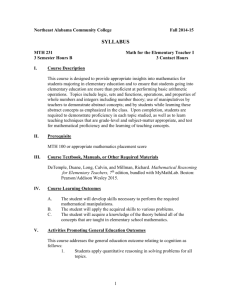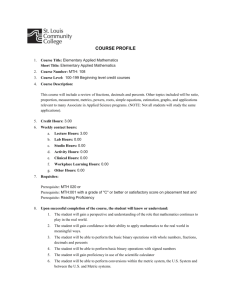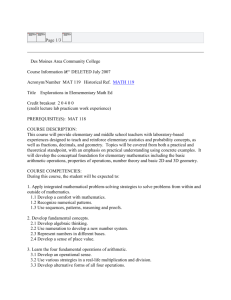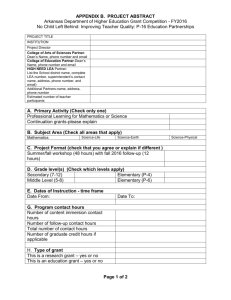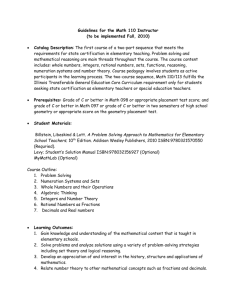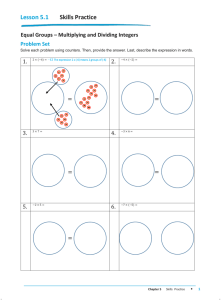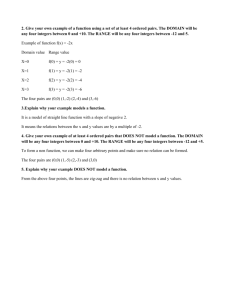MTH 231 - Jefferson State Community College
advertisement
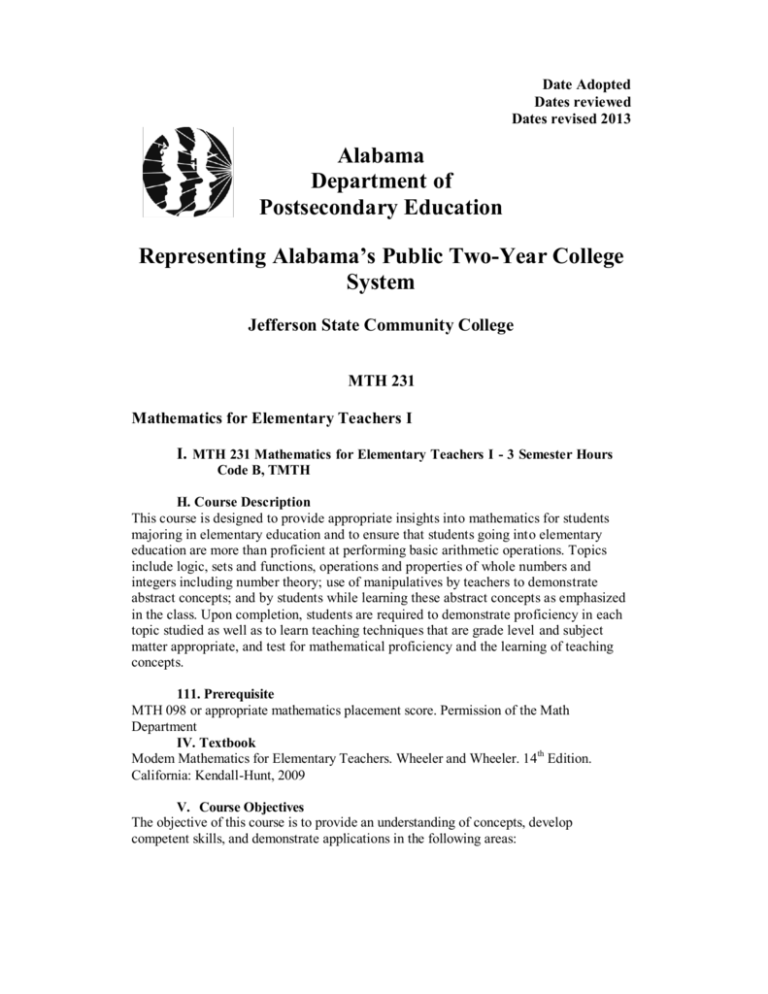
Date Adopted Dates reviewed Dates revised 2013 Alabama Department of Postsecondary Education Representing Alabama’s Public Two-Year College System Jefferson State Community College MTH 231 Mathematics for Elementary Teachers I I. MTH 231 Mathematics for Elementary Teachers I - 3 Semester Hours Code B, TMTH H. Course Description This course is designed to provide appropriate insights into mathematics for students majoring in elementary education and to ensure that students going into elementary education are more than proficient at performing basic arithmetic operations. Topics include logic, sets and functions, operations and properties of whole numbers and integers including number theory; use of manipulatives by teachers to demonstrate abstract concepts; and by students while learning these abstract concepts as emphasized in the class. Upon completion, students are required to demonstrate proficiency in each topic studied as well as to learn teaching techniques that are grade level and subject matter appropriate, and test for mathematical proficiency and the learning of teaching concepts. 111. Prerequisite MTH 098 or appropriate mathematics placement score. Permission of the Math Department IV. Textbook Modem Mathematics for Elementary Teachers. Wheeler and Wheeler. 14th Edition. California: Kendall-Hunt, 2009 V. Course Objectives The objective of this course is to provide an understanding of concepts, develop competent skills, and demonstrate applications in the following areas: 1. To ensure that students going into elementary education are more than proficient at performing basic arithmetic operations. 2. To ensure that Students demonstrate proficiency in each topic studied as well as to learn teaching techniques that are grade level and subject matter appropriate. 3. To ensure that students are required to test for mathematical proficiency and the learning of teaching concepts. VI. Course Outline of Topics A. This course shall include the following topics as a minimum. 1. Problem solving A. Critical thinking B. Inductive reasoning C. Strategies for problem solving 2. Logic A. Statements 1. Conjunction 2. Disjunction 3. Negation B. Conditionals C. Quantifiers D. Valid arguments 3. Sets, relations and functions. A. Set notation and operations B. Cartesian product C. Relations D. Functions 4. The Real number system A. Whole numbers 1. Operations 2. Algorithms 3. History 4. Non-decimal bases B. Integers 1. Operations 2. Primes, composites, and factorization 3. Greatest common divisor 4. Least common multiple 5. Modular arithmetic C. Rational numbers 1. Operations 2. Ratio and proportion 3. Decimals 4. Percent D. Irrational numbers 5. Informal Geometry A. Basic Ideas B. Lines, planes and angles C. Simple closed curves D. Simple closed surfaces E. Measurement 1. perimeter 2. area B. Optional topics may include the following: 1. Linear measure and the metric system A. measurement B. SI units of measure C. The metric system VII. Evaluation and Assessment A. College requirements: Examinations should be given by instructors periodically throughout their courses. Faculty are encouraged to give evaluative work early in the term so that students will have a clear understanding of the progress they are making. Final examinations will be given in all classes, and all students enrolled for academic credit will take the final examination. (College Handbook, section 3.7) B. Grading system as stated in the college catalog: *A - Excellent (90-100%) *B - Good (80-89%) *C - Average (70-79%) D — Poor (60-69%) F — Failure (below 60%) W - Withdrawal (before midterm) WP - Withdrawal passing (after midterm) WF - Withdrawal failure (after midterm) I - Incomplete AU - Audit RW - Required withdrawal *Satisfactory grades C. Evaluation and assessment techniques may include any or all of the following: 1. Recitation 2. Daily assignments 3. Written assignments 4. Computer assignments 5. Projects 6. Participation 7. Exams To receive a grade of "C" or higher, the student must obtain an average of at least 70% on written test(s) and other evaluation criteria as determined by the instructor. ** Note: A grade of "C" or higher is required in this course for a student to be eligible for MTH 232. VIII. Class Activities A.Lecture. B. Recitation. C. Discussion. D. Individual instruction. E. Testing. IX. GENERAL COURSE COMPETENCIES A. The student will acquire knowledge of mathematical terminology. B. The student will acquire knowledge of the development of the real number system. C. The student will acquire knowledge of geometry and measurement. X. COURSE OBJECTIVES STATED IN PERFORMANCE TERMS A. The student will demonstrate knowledge of mathematical terminology as measured by his/her ability to 1. recall the meaning of the following in order to work problems requiring knowledge of the following: a. Sets and operations on sets. b. function notation. c. domain. d. range. e. cardinal number. f. whole numbers and operations on whole numbers. g. integers and operations on integers. h. rational numbers and operations on rational numbers. i. decimal numbers and operations on decimal numbers. j. prime and composite numbers. k. greatest common devisor and least common multiple. 1. basic geometric and measurement terms. 2. use inductive and deductive reasoning. 3. compare different number systems. 4. use logic to determine the validity of an argument. B. The student will demonstrate knowledge of the development of the real number system by his/her ability to 1. apply definitions to solve given problems 2. use different algorithms to solve problems. 3. identify properties of a. natural numbers. b. whole numbers. c. integers. d. rational numbers. e. real numbers. C. The student will demonstrate knowledge of geometry and measurement by his/her ability to 1. name geometric figures correctly. 2. identify curves and polygons. 3. identify lines of symmetry in polygons. 4. measure lines and angles. 5. convert from English to metric and within the metric system. 6. compute area and perimeter of given polygons XI. Attendance Students are expected to attend all classes for which they are registered. Students who are unable to attend class regularly, regardless of the reason or circumstance, should withdraw from that class before poor attendance interferes with the student's ability to achieve the objectives required in the course. Withdrawal from class can affect eligibility for federal financial aid. XII. Statement on Discrimination/Harassment The College and the Alabama State Board of Education are committed to providing both employment and educational environments free of harassment or discrimination related to an individual's race, color, gender, religion, national origin, age, or disability. Such harassment is a violation of State Board of Education policy. Any practice or behavior that constitutes harassment or discrimination will not be tolerated. XIII. Americans with Disabilities The Rehabilitation Act of 1973 (Section 504) and the Americans with Disabilities Act of 1990 state that qualified students with disabilities who meet the essential functions and academic requirements are entitled to reasonable accommodations. It is the student's responsibility to provide appropriate disability documentation to the College. The ADA Accommodations office is located in FSC 300 (205-856-7731).
